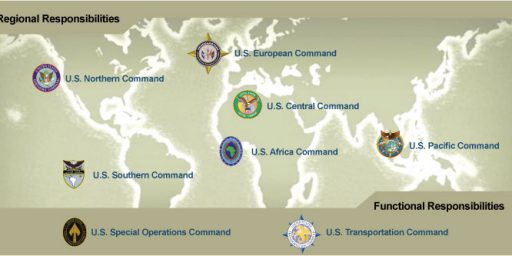A History of Acronyms
Robert Lane Greene investigates the rise of acronyms, initialisms, and other informal shortenings of speech.
Robert Lane Greene investigates the rise of acronyms, initialisms, and other informal shortenings of speech. It’s a phenomenon of which he’s apparently not fond.
The armed forces have much to do with it. And the American army seems to have contributed more than its share. But acronyms don’t have a particularly long pedigree. You won’t find them in the papers of GEN George Washington or LTG Ulysses Grant. (Grant was occasionally referred to as USG, but this was long before the “United States Government” he fought for was universally known by those same letters in bureaucratese, as it is today.) David Wilton, a linguist, says that a 19th-century “smattering” turned into a flood with the first world war, when one of the most famous among them, AWOL (“absent without leave”), is definitively attested for the first time.
The smattering became a smorgasbord with the coming of FDR—the first president (1933-45) to be known so frequently by his initials alone. Roosevelt brought the New Deal economic programme, and many a pointy-headed planner, to Washington, DC. In the midst of the Great Depression, these idealists thought they could remake society with a host of new government programmes. The long names begged for a shorthand: when the Tennessee Valley Authority and the Works Progress Administration were being rushed out of the door, it was natural to dub them the TVA and the WPA.
There may have been another temptation as well. The use of letters as symbols began with the physical sciences: Jons Jacob Berzelius had invented the one- and two-letter system for the chemical elements in 1813, and physicists had unlocked the secrets of the universe with insights from F=MA to E=MC. By analogy, perhaps, something that had an acronym felt scientific and controllable, tempting to government planners in the chaotic world of the mid-20th century. Enter the FBI to police the country, the CIA to spy on others, and the SEC to wrestle with financial markets.
[…]
The conservative anti-acronym crusader may grind to a halt when considering the business world, which is a long-standing source of acronymy. In 1901 the National Biscuit Company sought a trademark for a new short form of its name—Nabisco. The “co” trend took off, especially with oil companies (Texaco, Conoco, Sunoco), using a different kind of acronym, one that pulls together first syllables, not just letters. But the rise of the initialism and acronym proper were not far off; the stock-ticker and other space-compressed media did not cause, but helped accelerate, the trend towards shorter names. The century-long process that gave birth to IBM, GE and AT&T has culminated with many companies preferring not to be known by their original names. IBM may still do international business but it no longer makes most of its money selling machines. GE does so much more than electronics that it rarely refers to itself as General Electric. AT&T would prefer you forget the “telegraph” in its name, though American iPhone users might prefer a telegraph to the much-derided voice service bundled with their handset by AT&T. The desire to shed an old association goes doubly for the second word in Kentucky Fried Chicken, now served up by a company called KFC. God bless Radio Shack for resisting the trend. But how long before they become RS.com?
[…]
This trend points to good news as we drown in ever more acronyms. They are a mere microcosm of language, sharing most of the properties of language generally. So just as the bureaucrats coin jargon, waffle and acronyms, the grunts and drones will continue to fight back against the plodding predictability of acronymic churn. And kids will continue to speed up the process by replacing anything that catches on too broadly—to the next generation, “LOL” could be about as groovy as “groovy” is today.
Slang initialisms and nonce-acronyms survive in the crowded marketplace of language because they fill a useful function. A SNAFU (situation normal: all fucked up) filled a void; it’s not just any screw-up, it’s the screw-up caused by some title-inflated CTO or SVP trying to impose TQM (total quality management) on his remaining subordinates. Soldiers, who have to face the reality of life and death on the battlefield along with the fact that they work for a giant bureaucracy, are a prolific source of subversive acronyms. The American military mindset that gave us CENTCOM (Central Command), NORAD (North American Aerospace Defence Command) and NETWARCOM (Naval Network Warfare Command) has also come up with SNAFU and FUBAR (fucked up beyond all recognition). In the famous profile in Rolling Stone that led to Stanley McChrystal’s resignation as America’s commander in Afghanistan, some troops were quoted as mocking the non-Americans serving with them in the International Stabilisation Force for Afghanistan: ISAF, they said, really stood for “I suck at fighting”. Soldiers will subvert acronyms as long as superiors think they can drive off the fog of war with the seductive quasi-certainty of the caps-lock key.
Actually, the more popular corruption of ISAF is “I Saw Americans Fighting.”
But Greene’s tour covers the multiple origins of the rise of acronyms and initialisms. As the world got more complicated, we needed longer strings of words to describe things and shorthand to convey them easily. And organizations known by initialisms sometimes have names that have gone out of style, so they drop the old meanings. And it’s safer to hide vulgarity in code word than come out and say it.







Heh, try being a programmer. We don’t even use regular words. Everything is an acronym/initialism.
How about the Society for the Elimination of Acronyms (SEA)?
Any discussion of initials always reminds me of the Initials song from Hair.
http://www.youtube.com/watch?v=j1zy9MW8CkA
“But acronyms don’t have a particularly long pedigree”
SPQR?
That’s a couple of thousand years old.